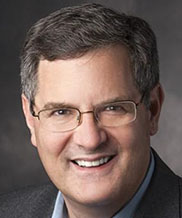Intelligent Agents, the Knowledge Graph and Open Data for Learning
 Mark Musen is Professor of Biomedical Informatics at Stanford University, where he is Director of the Stanford Center for Biomedical Informatics Research. Dr. Musen conducts research related to intelligent systems, reusable ontologies, metadata for publication of scientific data sets, and biomedical decision support. His group developed Protégé, the world’s most widely used technology for building and managing terminologies and ontologies. He is principal investigator of the National Center for Biomedical Ontology, one of the original National Centers for Biomedical Computing created by the U.S. National Institutes of Heath (NIH). He is principal investigator of the Center for Expanded Data Annotation and Retrieval (CEDAR). CEDAR is a center of excellence supported by the NIH Big Data to Knowledge Initiative, with the goal of developing new technology to ease the authoring and management of biomedical experimental metadata. Dr. Musen chaired the Health Informatics and Modeling Topic Advisory Group for the World Health Organization’s revision of the International Classification of Diseases (ICD-11) and he currently directs the WHO Collaborating Center for Classification, Terminology, and Standards at Stanford University.
Mark Musen is Professor of Biomedical Informatics at Stanford University, where he is Director of the Stanford Center for Biomedical Informatics Research. Dr. Musen conducts research related to intelligent systems, reusable ontologies, metadata for publication of scientific data sets, and biomedical decision support. His group developed Protégé, the world’s most widely used technology for building and managing terminologies and ontologies. He is principal investigator of the National Center for Biomedical Ontology, one of the original National Centers for Biomedical Computing created by the U.S. National Institutes of Heath (NIH). He is principal investigator of the Center for Expanded Data Annotation and Retrieval (CEDAR). CEDAR is a center of excellence supported by the NIH Big Data to Knowledge Initiative, with the goal of developing new technology to ease the authoring and management of biomedical experimental metadata. Dr. Musen chaired the Health Informatics and Modeling Topic Advisory Group for the World Health Organization’s revision of the International Classification of Diseases (ICD-11) and he currently directs the WHO Collaborating Center for Classification, Terminology, and Standards at Stanford University.
In this talk, Mark dives into how knowledge graphs offer formal representations of human knowledge with the ability to link concepts in those graphs to relevant datasets and structures that people and intelligent agents can search to discover new relationships between the things that we know and the data that may support those conclusions. Mark goes deeper into…
1. Scientists are learning that the real outcome of their work is not the papers that they publish, but the data that their experiments generate.
2. Current technology is making scientific data more Findable, Accessible, Interoperable, and Reusable (FAIR).
3. Future technology will allow intelligent agents to assist scientists in making sense out of data, planning new investigations, and making new discoveries.